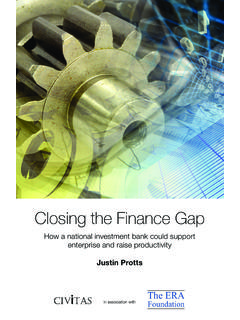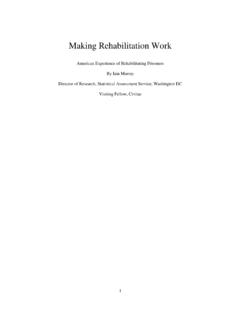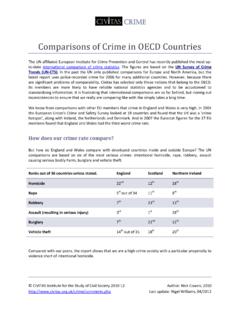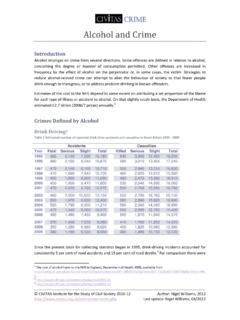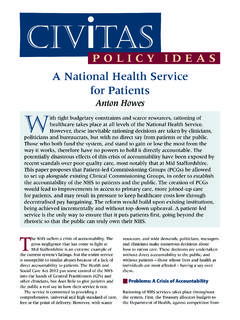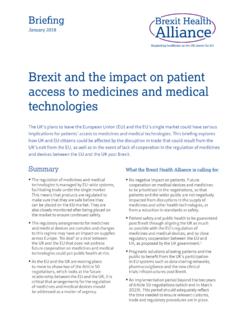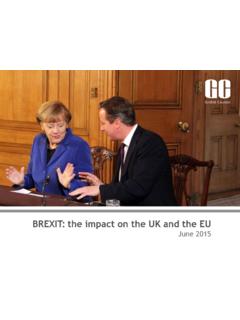Transcription of Supporting Industry Post-Brexit: Supply chains and …
1 Supporting Industry post - brexit : Supply chains and the automotive Industry Briefing note: May 2017 Justin Protts The automotive Industry performed at record levels over the last year. In 2016, million cars were built in the UK, with million of these exported,1 and in March 2017 the Industry saw 562,337 new cars registered in the UK, the highest ever levels of exports and As well as being under pressure to develop an industrial policy which will support growth in an Industry with 169,000 people employed in manufacturing vehicles and which supports around 814,000 jobs across the UK, the government will need to ensure policies are in place to help the automotive Industry adapt in light of the UK s vote to leave the On leaving the single market and customs union.
2 Issues such as rules of origin, customs delays, tariffs and regulatory diversion all have the potential to harm automotive production, which is dependent on a global Supply chain . These are concerns that will be shared by all exporting manufacturing industries and those which are part of, or rely on, Supply chains that extend into the rest of the EU. This report examines what lessons can be learnt from the automotive Industry as a current manufacturing success story with a growing domestic Supply chain , high productivity, and strong growth, and how government could use its new industrial strategy to support manufacturing as the UK prepares to leave the European Union.
3 The report reviews how the automotive Industry has reacted to the UK s vote to leave the European Union, and the government s decision not to seek single market membership or retain the Common External Tariff. It also identifies the primary challenges and opportunities for the Industry post - brexit . In light of these challenges, we review the support the automotive Industry has received and find that UK policies in recent years have been highly successful, encouraging strong growth in domestic and export markets. This has been driven by investment that has resulted in the growth of domestic Supply chains , Supporting productive jobs and a creating a more stable and sustainable environment for a vital UK Industry .
4 The creation of the automotive Council 1 Lloyds Bank, automotive Research Report 2017 , (accessed 29 March 2017) 2 SMMT, Records tumble as March UK market hits all-time high , (accessed 29 March 2017) 3 BEIS Select Committee, Written evidence from the Society of Motor Manufacturers and Traders, ,%20 Energy%20and%20 Industrial%20 Strategy/Industrial%20strategy/ (accessed 24 March 2017) 2 in particular has allowed for continuous dialogue between Industry and government and encouraged productive business-led investments. As part of the effort to build a new industrial strategy it is essential the government listens to calls for investment in the UK automotive Supply chain .
5 We recommend that the government invests across the UK s manufacturing industries either through the expansion of the Advanced Manufacturing Supply chain Initiative or through new substantial Supply chain initiatives that provide support for all manufacturing industries across all regions of the UK. Such investment should be accompanied by a more prominent role for UK Industry -government bodies which should aim to replicate the success of the automotive Council, in areas such as chemicals, pharmaceuticals, aerospace, defence, and power generation, by encouraging targeted and productive investment. Such a policy should encourage the Department for Business, Energy and Industrial Strategy to engage continually with Industry bodies and encourage business-led investment by government in UK manufacturing.
6 The example of the automotive sector shows that such investment can have a broad positive impact on Supply chains and could help to secure and grow the UK s manufacturing base. The autom otive indus try in the UK The automotive sector is a significant manufacturing Industry , employing 169,000 people and Supporting 814,000 jobs across the wider UK Exports of road vehicles and related products accounted for per cent of UK goods exports, equating to 32 billion in 2015. Imports to the UK of Road Vehicles and related products accounted for per cent of UK total goods imports, equating to 50 billion in This 18 billion deficit in trade is partly due to the UK automotive Industry s reliance on imports for manufacturing cars, with over half the content of British built cars being imported into the UK.
7 The SMMT estimates that, since 2011, UK content of British built cars has increased from 36 per cent to around 41 per Despite this increase, in part due to government support aimed directly at boosting UK Supply chains , there is still unmet potential for domestic suppliers to expand their contribution to the Supply chain and reduce the Industry s reliance on imported components. The SMMT calculates that as much as 80 per cent of components could be made in the UK. Comparisons with other nations with major automotive industries, such as Germany, suggest the UK could realistically aim to source around 60 per cent of auto components Any successful attempt to boost the domestic Supply chain in the UK would almost certainly have the most positive impact on the North East, the West Midlands, and the South East, the three regions of the UK which export the most automotive For the North East and 4 BEIS Select Committee, Written evidence from the Society of Motor Manufacturers and Traders.
8 %20 Energy%20and%20 Industrial%20 Strategy/Industrial%20strategy/ (accessed 24 March 2017) 5 Percentages calculated from HMRC UK Regional Trade Statistics. (accessed 8 March 2017) 6 SMMT, Supply chain , , (accessed 9 March 2017) 7 I. Henry, Long-term forecast paper for The Society of Motor Manufacturers and Traders (SMMT): The future of UK automotive manufacturing in 2025 and beyond , AutoAnalysis, October 2015, 8 As measured by value in 2015. HMRC UK Regional Trade Statistics, (accessed 8 March 2017) 3 the West Midlands it could provide a significant economic boost because automotive products make up 37 per cent and 50 per cent of these regions exports, Boosting the UK s domestic Supply chain could create sustainable semi-skilled and skilled manufacturing jobs in the UK and reduce the Industry s reliance on international Supply chains , helping balance out the UK trade deficit by reducing imports and, as highlighted later, enabling the Industry to maintain tariff free access for exports if a new trade deal is agreed.
9 As manufacturing jobs also tend to have higher productivity, reflected in incomes with average annual earnings in the manufacturing sector of 31,489 in 2015, almost 4,000 more than the UK average and 4,500 more than for services,10 investment in a major manufacturing Supply chain could help boost the UK s stagnant productivity Following the UK s vote to leave the European Union, the automotive Industry , along with other major exporters of manufactured goods, may face a number of new challenges as a result of the expected departure of the UK from the EU s single market and customs union. New customs arrangements could disrupt cross border Supply chains or raise their cost, and rules of origin could act as a barrier which, even with a trade agreement, could see tariffs put on UK manufactured goods.
10 The im pac t of brexit Throughout the referendum campaign and since, much was made of the potential impact of brexit on the UK s manufacturing industries, which currently make use of barrier-free trading arrangements within the EU for both importing and exporting products. Whilst UK-EU negotiations will seek to deal with such issues and prevent unnecessary barriers to commerce, concerns exist because current trading arrangements depend on EU membership and any new deal could involve some change. As a result, a number of car manufacturers with factories based in the UK have made public comments relating to the impact of brexit on their UK based operations.
